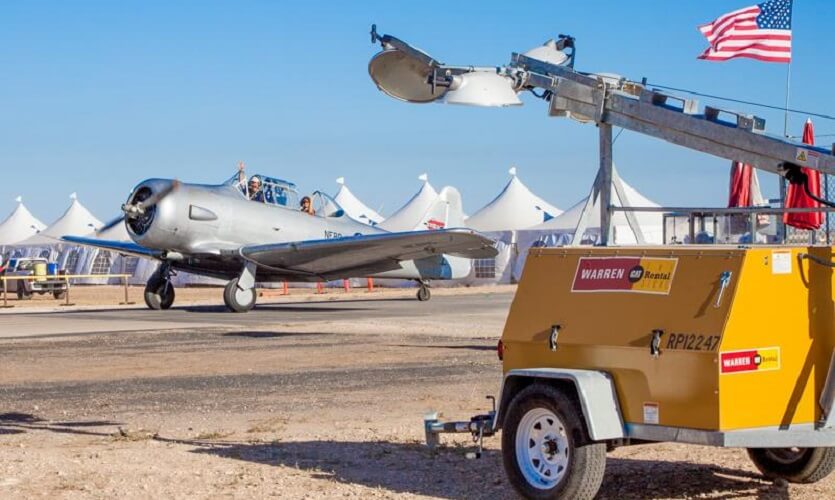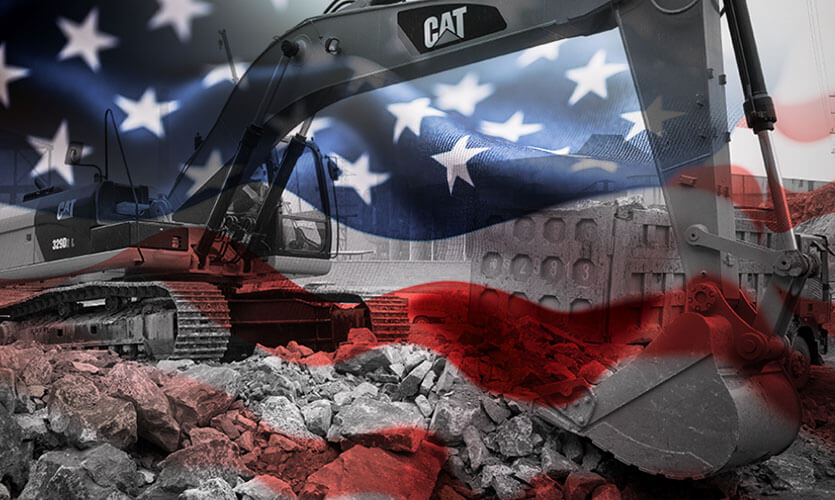Planning a successful event is a challenge. Coordinating suppliers and vendors takes organization, resourcefulness and great communication skills. So does making sure your event has all the amenities needed. Missing a small step can cause a big problem.
Many customers have questions about how to rent power equipment for weddings, sports events, fairs and festivals. We often hear questions about how to select equipment and how to determine what is needed. One of the most common questions is how to provide power to outside event sites.
Determining what type of equipment and power your site will need is one of the biggest challenges most planners face. Estimate too high, and you’ll overspend on fuel and electric. Guess too low, and your guests can be left in the dark.

That’s why we’ve created this guide to understanding and planning for your event’s power needs. Read on to find answers to some of the most common questions about powering outdoor events.
What Types of Equipment Will You Need?
One of the most important steps of planning a successful event is making sure you have all the amenities needed. If you’re planning a large festival or fair, this can get especially complicated. You’ll need to work with different vendors to determine how much power they need and where they need it.
Some of the most essential types of equipment include:
- Generators. Generators can supplement existing power from a main source, or they can power an entire event. Generators can vary by size and fuel type. Secondary generators can be used when your power source needs a little boost to accommodate peak times. You can also use multiple generators when equipment needs an individual power source or when your event site is spread out.
- Lighting. Many event planners rent light towers for major events. These portable event lighting rentals are used for fairs, festivals, sports events and construction. They’re particularly useful for events in the evening or at night. Renting light towers with LED lights has become a popular option for event planners looking to reduce their energy use.
- Air conditioning. Depending on the season and time of year that your event takes place, you may want to consider renting a portable air conditioner. Portable temperature control equipment can help you provide a pleasant atmosphere for your guests. Consider renting a heater and generator combo for outdoor weddings during cooler seasons. Portable air conditioners are more suited to warm weather festivals, fairs and weddings.

What Other Event Equipment Should I Include in My Power Needs?
Although lighting and temperature control are some of the biggest power uses during a fair or festival, you should take into account other equipment needs when deciding on generator power. This equipment might include:
- Audio equipment
- Drink machines
- Blenders
- Coffee makers
- Popcorn machines
- Photo booths
Most equipment has the voltage required to operate it marked clearly on its nameplate. Vendors can also help you determine how much energy you’ll need to operate these items.
How Do I Decide Whether to Rent or Purchase Event Equipment?
If you hold events on a regular basis and have a good understanding of your power needs, consider purchasing equipment. If you hold events occasionally, your equipment needs change regularly or you don’t yet know what equipment you need, renting is a more prudent choice.
You’ll benefit from renting equipment in other ways, as well:
- There’s no maintenance for you.
- You can avoid storing equipment between events.
- You can easily try out upgraded equipment.
- It’s easier to take advantage of new energy efficiency technology.
Many event planners use a combination of rented and owned equipment. If you have just a few light strands or a light tower, you can supplement your collection with outdoor rental lighting equipment. It’s also common for one coordinator to rent if your event has multiple food or entertainment vendors.
If you’re new to setting up event power services, our experienced technicians can help you determine what equipment you need and make sure it’s compatible with your own. We’ll even transport it and set it up for you.
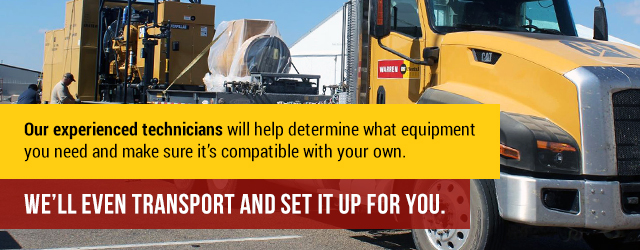
Can I Use Regular Outlets for My Event?
Yes! If your event site has mains power, you can certainly use it for equipment. Mains power is a reliable, cost-effective way to power your event equipment. Remember to check the volts and amps the equipment requires, and make sure the mains can provide it.
However, many outdoor events have either no mains power or very limited power. For larger events, mains power might too far away from where it’s needed. A good rule of thumb is to consider using a generator if your mains power is more than 100 feet away.
If your event has limited power or is spread out over a large area, consider renting one or more generators to provide additional power for equipment.
How Do I Figure out How Big of a Generator I Need?
Sizing your generator correctly is one of the hardest parts of renting event equipment. You’ll need to do some math to figure out what size generators you’ll need for your event. You’ll also need to know three different ways to measure energy and how to convert between them.
The following formula will help you convert between volts and watts:
Amps x Volts = Watts

What does this mean?
Most generators measure output by watts. A generator’s output needs to be slightly higher than the sum of all of the energy used by the equipment that will draw from it. Once you’ve determined how much electricity your equipment will need, you’ll be able to choose a generator.
Unfortunately, most event equipment doesn’t measure its energy usage in watts. Lights, heaters and audio equipment usually use amps and volts to measure energy consumption. The amps and volts needed to power different equipment is usually marked on its nameplate.
Amps measure how fast electricity flows. Many regular outlets have 15 to 20 amps, which is enough to power standard household electronics. Major appliances like a stove or washing machine might require a 60-amp circuit. If you’re renting heating and cooling equipment, it’s likely to need a circuit with more amps.
Volts measure the pressure of electricity. Most household circuits are 110- or 220-volt circuits. Heating, cooling and cooking equipment usually requires higher voltage than light towers or small appliances.
What Is Peak and Base Power?
Remember to consider your peak and base power usage when you’re planning your energy needs for an event.
Peak power is the maximum amount of energy needed. This occurs when many pieces of equipment are drawing power at the same time. Peak power usage can be caused by a number of events. Some of these include:
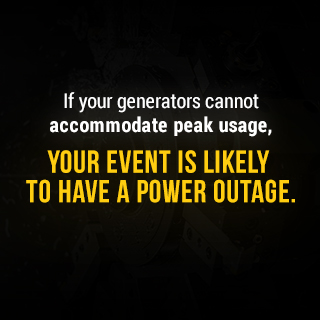 Powering up equipment
Powering up equipment- A major event that requires more lights or audio than the rest of the festival
- A surge in use of food and drink appliances around meal times
- A particularly hot or cold period in the day
If your generators cannot accommodate this peak usage, your event is likely to have power outages. If you know in advance when peak energy use will occur, you can save energy by using additional generators during this time.
Base energy use is an average of energy used during your event. Your generator must be large enough to handle this base energy usage. However, many people size their generators to accommodate only peak loads. This causes them to spend more on fuel and electricity than needed.
Knowing both your base and peak energy use will help you size your generator effectively.
What Other Factors Affect My Event Power Rental Requirements?
Along with the event equipment, there are several other factors that affect what type of power equipment you’ll need to rent. Remember to include the following considerations as you decide on your power needs:
- Temperature. Is your event planned for a particularly hot or cold period? Will you need additional temperature control equipment?
- Startup power. Some equipment, like sound equipment, needs more power at startup. Then its power consumption settles into lower usage. If your equipment needs more power when it’s starting up, do you need a secondary generator?
- Time of the event. Will your event last for multiple days? If so, are there peak periods where you need more power? Alternately, can you use secondary, smaller generators in the evening?
- Location of power sources. Is your equipment close together? If so, you may be able to use a single generator. If not, should you consider multiple generators spread throughout the site?
- Special equipment needs. Does any equipment need its own generator? Is all equipment compatible with the same types of generators?
- Long term consumption. Will you be running equipment for more than three hours consecutively? These long-term power needs are called continuous loads. If some of your equipment has a continuous load, the generator’s power output will be reduced by approximately 10 percent.
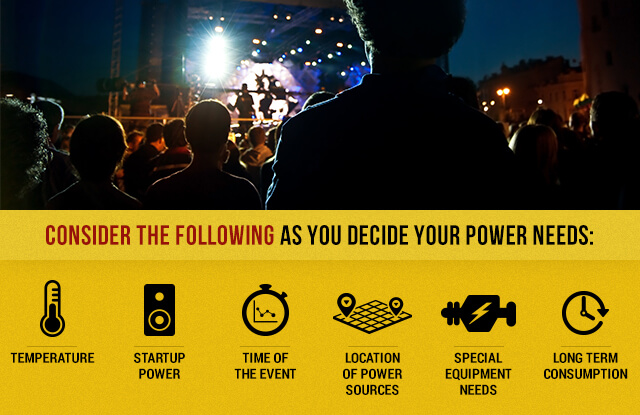
How Do I Find out About my Suppliers’ Event Power Needs?
Power is one of the five largest costs for most events, and many event planners find that fuel is wasted. In some festivals, more than 60 percent of generators operate at less than 25 percent capacity. The biggest reasons for this waste are lack of knowledge and lack of communication.
You can have a more energy-efficient event by communicating ahead of time with your vendors and suppliers. Before your event, contact each vendor find out how much power they’ll need and any special considerations. Use these three tips to understand your vendor’s power needs:
- Clarify “padded” numbers. Many suppliers pad their power needs to make sure equipment won’t short circuit during the event. Unfortunately, event planners often add extra to these estimates. As a result, many events have oversized generators. To avoid this, clarify the actual power needs and whether suppliers have padded their estimates.
- Ask for the actual amperage needed. It’s common for event planners to ask suppliers whether they need 16- or 32-amp power sources. With this strategy, it’s easy to overestimate your power needs. Instead, ask suppliers how much power they’ll need. These numbers will help you determine how many generators you’ll need to rent.
- Determine your supplier’s “peak” energy usage. Some suppliers provide only the peak, or maximum, energy usage. You can get a better sense of your power needs by finding out their peak usage, when it is and how long it usually lasts. Make sure to ask them about their base usage as well.
What’s Wrong With an Oversized Generator?
We often see oversized generators used at festivals and fairs. These generators produce significantly more power than is needed — often less than a quarter of the power created is used!
Oversized generators produce significantly more electricity than you need, which can add up when you’re planning an event. Oversized generators also contribute to a big carbon footprint. And some generators, particularly diesel generators, can be damaged when loads are too low.
Many people rent larger generators than they need because they want to avoid power outages and be sure there is adequate event power distribution. Having a little more energy available is useful, but many events have vastly oversized generators, which isn’t ideal.
Instead, work with your technician to plan your power needs. An experienced technician can suggest ways to distribute power throughout an event site and supplement generators as needed to reduce your costs.
How Do I Distribute Power at an Event?
For many events, particularly large fairs and festivals, you’ll need to consider power distribution. A good rental equipment company will help you plan and set up equipment to distribute power.
If you’re doing it yourself, keep these tips in mind while you’re setting up:
- Don’t put all your lighting on one circuit. If the generator that powers your light towers breaks down or is overloaded, your event will be left in the dark. Along with interrupting the event, it’s harder to reset a generator in the dark. To avoid this, distribute light strands and towers across multiple generators.
- Keep electrical runs short. When running cords from generators to equipment, keep the runs as short as possible. The distance between the generator and equipment should be less than 100 feet, and usually much shorter.
- Check your connections before the event. Check for broken grounds and make sure equipment cords don’t pose a tripping hazard. Consider using cable protectors, raceways and industrial tape to protect your cords and connections.

How Can I Make My Event More Energy Efficient?
Since energy is one of the biggest costs for most events, it makes sense to look at energy-efficient power options. There are a growing number of ways you can reduce your energy use:
- Make sure your generators are sized appropriately. Many people use oversized generators. This can be the result of poor communication, padding estimates or requests for generators for single items. Using an oversized generator can increase your fuel costs and even damage the generator.
- Consider using secondary generators to accommodate peak times or unusual layouts. The company you’re renting equipment from can help you set up your generators in a way that minimizes energy use.
- Consider environmentally-friendly power sources and equipment. Light towers with LED bulbs are a popular way to decrease energy use. You can also find solar-powered light towers and equipment. Finally, some generators now run on biodiesel or hybrid systems. All of these technologies can reduce your energy use.
- Let your suppliers know you’re encouraging energy efficiency. Turning off unused equipment and lights is still one of the most effective ways to reduce energy use. Reminding people to be energy conscious can make a big difference.

What Should I Look for When I’m Renting Event Equipment?
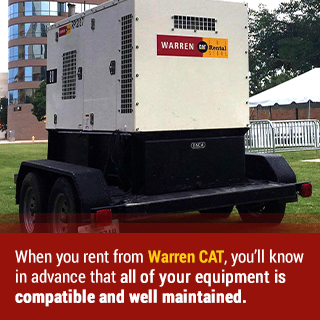
The most important think to look for is well maintained equipment. When equipment is well maintained, it is less likely to break down during an event. Many rental equipment companies have logs that show the maintenance and use-hours for the equipment you’re considering.
It’s also ideal to make sure all of your equipment is compatible ahead of time. Incompatible equipment can hold up events or keep you from recording a special moment. When you rent from Warren CAT, you’ll know in advance that all of your equipment is compatible and well maintained.
If you’re renting to supplement your own equipment, make sure you have a compatible power source for anything that requires special outlets or power sources. This is particularly important if you’re renting equipment for the first time.
One of the benefits of renting event equipment is easy access to new technology. When you’re choosing event rental equipment, avoid outdated models. If any equipment requires software, make sure it’s updated.
What Should I Look for in an Equipment Rental Company?
Along with the right equipment, there are several things you should look for in a good equipment rental company.
If you’re renting for an event, we encourage you to look for a company with experienced specialists. Determining event power needs is a challenge. Skilled technicians will work with you to plan your equipment needs and event power distribution properly. A good rental equipment company should be willing to discuss your event and suggest suitable equipment.
You should also look for a reliable equipment rental company. A reliable company like Warren CAT will make sure the equipment you’ve rented is in working order and is available when you need it. We’ll also be able to work with you to troubleshoot any problems that occur while you’re setting up.
Depending on your distance from the store and the size of equipment you’re renting, you may want to look for a dealer that will transport your equipment to the event site. If you’re located in Oklahoma, West Texas, or the Texas Panhandle, we’ll transport and set up your equipment for you.
You can view some of the equipment we offer, or work with one of our experienced specialists to determine what equipment is right for your event.
To find out more about renting equipment for your next event, call us today at 866-292-7736.
